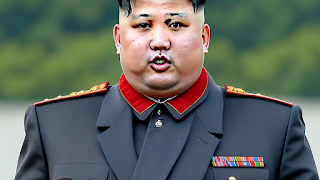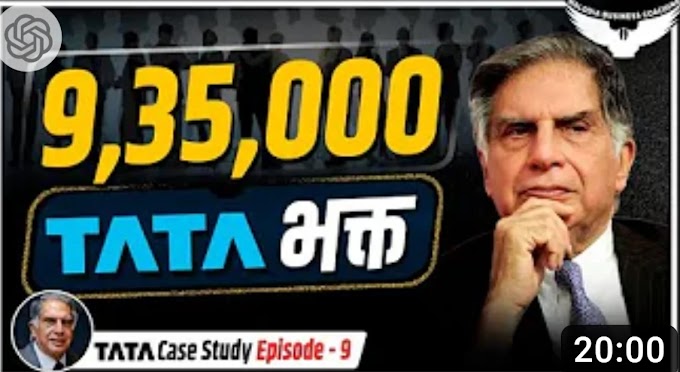Unmasking the Illusion: Distinguishing Genuine Leaders from slaves of masters.
"A real leader faces the music, even when he doesn't like the tune." - Arnold H. Glasow
What is Leadership?
Lots of people have questions about leadership, what is leadership what does real leadership mean, what's the difference between fake leadership and real leadership, what are the characteristics of a good leader, and so on. Leadership is an abstract concept but let us try to explain you with examples. So who do we consider to be India's greatest leader of the past hundred years, if you ask the Indian government, they will certainly say that the greatest Indian leader in the past 100 years is this gentleman, Mr. Mohandas Gandhi and even if you ask your school history teacher and if you read your history text books or if you watch the Indian media news channels , etc... they all extol Mr. Gandhi's virtues to the high heavens . Also according to the general consensus, the greatest leader India has seen the past 100 or 150 years is Mr. Mohandas K Gandhi.
So let's take this as an example and let's discuss what leadership actually is. What is leadership? What are the hallmarks of a good leader? To further investigate this, let's ask this question: Mr. Gandhi, whom did he represent as a leader? Whose interests did Mr. Gandhi serve, protect, and promote? And whom did Mr. Gandhi serve? By asking these questions, it becomes a little more clear that the essence of leadership is service. True leadership is service, but remember not all servants are leaders.
Leadership according to Bhagvad Geeta & Lord Krishna
The essence of leadership is service, and secondly, note that a leader serves only a finite constituency. A leader cannot serve the whole world; a leader can only serve a finite number of people. Basically they cannot serve the whole world, but only a specific group. Let us understand this further. I'm sure you all recognize these words.
यदा यदा ही धर्मस्य ग्लानिर्भवति भारत, अभ्युथानम् अधर्मस्य तदात्मानं सृजाम्यहम् । परित्राणाय साधुनाम विनाशाय च: दुष्कृताम, धर्मं संस्थापनार्थाय सम्भावामी युगे युगे ||
So, what are these words? These words represent a leader's promise to his constituency. These words represent Lord Krishna's promise to the people of Bharat and the people who follow Dharma. He said that whenever there is a threat to Dharma and to the people of Bharat, then he will return and destroy Dharma. He makes this promise not to the entire world, but to the people of Bharat and the people who follow Dharma.
The thing is, no leader can serve the whole world. Some leaders say, 'I serve all humanity, I serve the whole world, I don't discriminate, I am everybody's leader.' What nonsense! Even if you wish to serve the whole of humanity, will they all take you as their leader? You can only serve those who accept you as their leader, and most people will not accept a single person. It is impossible for a leader to serve the whole of humanity. A leader can only serve a finite constituency. That is the second lesson of leadership.
Leaders across the world & whom did they serve
Now, ask yourself, what is the constituency of a certain leader? You have to ask yourself a simple question: whom did they serve? So tell me, whom did Julius Caesar serve? He served the people of Rome, and to some extent, he served himself. Whom did Napoleon serve? He served the people of France, and to some extent, he served himself as well. He was personally very ambitious. Whom did Abraham Lincoln serve? Abraham Lincoln served the people of the US, to some extent, but not all—not the Native Americans, not the women—but yeah, most Americans or some Americans. Whom did Winston Churchill serve? Did he serve the people of India or did he serve the people of the UK? He actually victimized the people of India and served the people of England.
Whom does Mr. Joker, the fine gentleman serve? Does he serve the people of North Korea, himself, or does he serve some other leader that he himself defers to? And what about this great gentleman, Mr. Imran Khan Nyazi? Whom did or does this fine gentleman serve? Does he serve the people of Pakistan, himself, or does he serve the Pakistani army? Whom does he serve? And what about the Pakistani army itself? General Bajwa, I believe. Whom does General Bajwa serve? Does he serve the nation of Pakistan, the Prime Minister of Pakistan, or himself? Whom did the gentleman, former Indian Prime Minister Manmohan Singh, serve? Did he serve the people of India or something else? Ask yourselves, whom did Muhammad Ali Jinnah serve? Did he serve the people of India or a certain section of the people of India, a certain community? And similarly, whom did Mr. Mohandas Karamchand serve? That is what you need to ask yourselves—whom did he serve, that is what you need to ask yourselves "whom did this great gentleman serve, right" just ask yourself this question to identify a leader.
Leadership & the Concept of Service along with the meaning of Fake Leadership
So to understand the concept of service. Let us take another example, Consider the example of the good shepherd, the good shepherd, so the good shepherd takes care of his sheep right, he has a flock of sheep whom he serves, he takes care of this sheep, he makes sure that they have enough food to eat every day, he makes sure that they go out every day in the pasture, get lots of grass to eat, lots of sunlight, in fact he makes sure they have plenty of water to drink, he makes sure that he keeps the big bad wolf far away from these sheep and he makes sure that they have a nice secure location in which the sheep can sleep at night and he makes sure that their children are taken care of and so on, so forth. So is not he a great servant of the sheep? whom does he solve problems for ? does he really serve the sheep? well actually the good shepherd serves the guy who owns the sheep. He does not serve the sheep, he serves the guy who owns the sheep and he is ensuring that the sheep get fat and healthy so that they can eventually be slaughtered. So he serves his boss, he is providing a certain service for a fee, he is not the leader of the sheep, he does not serve the sheep, he is their jailer, he is their prison guard, he is their slave driver.
That is what the good shepherd does he exploits his flock of sheep. His service is to his master not to his subordinates. In reality, his service goes upwards not downwards . So this shepherd is not a true leader. Even though he seems to serve the sheep he actually exploits them. Does this sound familiar my friends ? Right. So this is where service can be misunderstood the service seems to be for the sheep but is actually for the master.
Right now similar is the case for a project manager. A project manager is a leader right, you hear all the time about business, leadership and the people who are project managers they are told to read books about leadership and all that. But the truth is that this project manager, does not serve the employees who are under him, who are his subordinates. The project manager serves his company, his bosses so this person again is not a leader. This is fake leadership .He is just a servant. He is serving some other master.
What is True Leadership ?
So what is true leadership now ? true leadership is a selfless service, without expectations of rewards or payments, that is true leadership. The shepherd is a fake leader and so is this project manager.
India's National Interest and disguised puppets
Now let's ask another question going back to Mr. Gandhi, were Mohandas Gandhi's actions aligned with India's national interest? That's what I would like you to ask yourselves first, where his actions aligned with India's national interest. You might question what is this concept of national interest ? is it some vague undefinable back in nebulous concept, that has no definition or does it have a definition. What is the national interest? Let us try and make a definition , i.e. create a definition of the national interest.
Let's use this definition available at Wikipedia , "National interest means and involves safeguarding and promoting the long-term security prosperity and the territorial integrity of the nation and its people." This seems to be a reasonably good definition don't you think safeguarding and promoting then long-term security prosperity and territorial integrity of the nation and its people. So let us test this definition of national interest.
The Nation of Sheep
We will test it with the nation of the sheep. Assume there is a nation of the sheep, and these wonderful sheep, they are living in an area so let us call this a nation {it's a flock of sheep but that's a small nation right}. So these sheep, they are taken care of by their shepherd right, he takes care of them, he takes care of their security, he makes sure that this big bad wolf is kept far away and if the big bad wolf comes near the territory of the sheep, he is shot . So the shepherd provides security to the sheep, he also makes sure that they have enough to eat, they have all the pasture they need and even their children are taken care of. So there is more than enough prosperity that the sheep are enjoying. They do not have to do any work. In fact they do not have to work a single day in their life. They are provided everything they need and even their children and their children's children are provided everything they need and again the territory in which the sheep live that is secured by a fence. The sheep are provided prosperity and their territorial integrity is guaranteed by the shepherd and yet the shepherd is their exploiter.
So the sheep are living in an illusory world .They are living in an illusion of comfort of safety of security and prosperity but they are nothing but slaves. They think everything is fine in their nation, there are no problems. They think it's a wonderful world, sometimes they see some of their relatives taken away somewhere but they don't think too much about it right and this wonderful beautiful illusion is shattered only on the day they end up at the slaughterhouse .
So these sheep even though they have security, even though they have prosperity, even though they have territorial integrity, they are nothing but slaves. They are nothing but pieces of meat to be exploited by the shepherd and his master. So what was missing in this definition of the national interest? Two components were self-determination and cultural integrity. My dear Indians, have you heard of these things ?
Real definition of National Interest
So the true definition, a better definition of national interest is safeguarding and promoting the long-term security prosperity territorial integrity self-determination and cultural integrity of the nation and its people. You should be allowed to determine what happens in your temples, the government doesn't get to do it but they're doing it. So today you all are the sheep , unfortunately we all are sheep . Do you understand this severeness ? So this is the correct definition of national interest and that is what leadership also is.
So that's what I wanted to speak about. The true definition of leadership is this in their quality. The quality of leadership depends on how well or how poorly a leader's actions protect promote and serve the interests of their constituency i.e. the national interest right. That is what leadership is and to see whether someone's actions promote, protect and serve the national interests or not, you have to look at their actions, not their words.
Indians are very easy to please. People think that because they have said great words, this leader made this great speech in which he said so many nice things, so he or she must be a great leader. That's what the general consensus thinks and displays . But you have to look at a leader's actions, not speeches, not words, not tweets. What are they actually doing for. The for to serve and protect the national interest. That is what matters, that is what real leadership is.
So this is a very brief overview of what leadership is and what national interest is. It is a more complicated topic. Obviously we have just given you a very brief overview, but we hope it will give you the toolkit for thinking about leadership , of how to correctly think about leadership and national interest.
Also Watch : Abhijit Chavda on Real and Fake leadership .
Also Read : 13 PSYCHOLOGICAL HACKS to make you INSTANTLY SMARTER !
Also Read : Climate change and El Nino .
Also Read : The unending dominance of US Dollar as a Forex Reserve among Countries and its Impact on World .
Also Read : Is The Kerala Story a Propaganda film or a hidden unseen reality .
Also Read : New Ambassador to India for USA is a danger or a part of the Big plan to harm India .
Also Read : How is Overproduction by MNCs enhancing environmental Pollution .

































